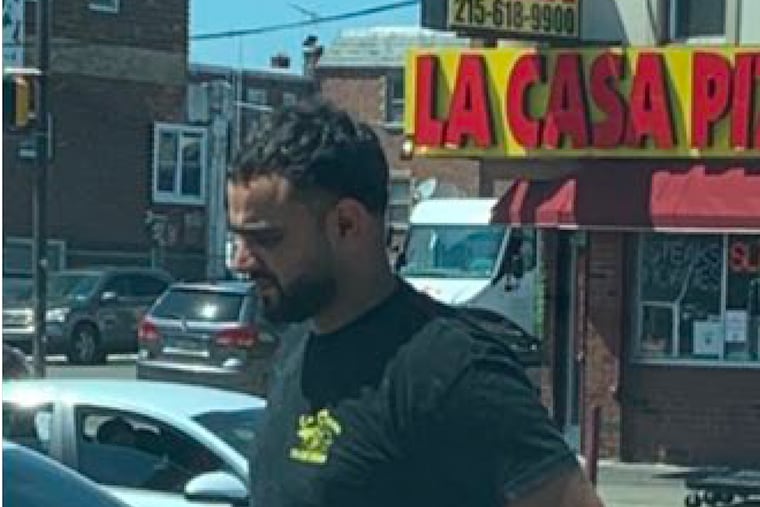Trial opens for pizza shop owner accused in arson death of Philly firefighter
A lawyer for accused businessman Al-Ashraf Khalil told jurors his client wasn't to blame for the June 2022 death of Philadelphia fire Lt. Sean Williamson.

As authorities charged him two years ago with setting a 2022 blaze at one of his properties that led to the death of a Philadelphia Fire Department lieutenant, Fairhill landlord Al-Ashraf Khalil adamantly denied involvement and maintained he was “in awe of the courage of the firemen involved.”
He opened his trial on federal arson charges Tuesday with a starkly different message: blaming the Fire Department for the death of one of its own.
“The actual cause of what happened,” defense attorney Gerald A. Stein told a jury of six women and six men, “was the neglect — the recklessness — [of fire officials] to prevent [firefighters] from going into that building to begin with because of the obvious danger.”
They should have known, Stein continued, that the burned-out shell of a building at 300 W. Indiana Ave. was unstable after the conflagration ripped through it and should have never sent Lt. Sean Williamson and four others inside to examine the damage.
The three-story structure collapsed on June 18, 2022, burying Williamson and the others in the rubble.
Williamson, 51 and a 27-year veteran of the department, died, unable to breathe as debris pressed down on his chest. The others — four firefighters and one inspector from the Department of Licenses and Inspections — survived with injuries.
Now, the question of who bears ultimate responsibility for those casualties will play a central role in the trial of Khalil and alleged accomplice Isaam Jaghama, the two men accused of igniting the blaze.
Prosecutors, in their own opening pitch to jurors Tuesday, rejected any contention that there was anyone else to blame but the two men seated by their lawyers at the defense table.
» READ MORE: ‘Truly one of our best’: Hundreds mourn Philadelphia firefighter killed in Fairhill building collapse
Still, the distinction is crucial to whatever verdict jurors may render. Should they convict the men of arson charges, they will be asked to separately decide whether Williamson’s death was a foreseeable result.
If the panel answers “yes,” Khalil and Jaghama could face life in prison.
Khalil, 30, has admitted in court papers in the run-up to this week’s proceedings that he set the fire hoping to collect on a nearly $500,000 insurance policy he held on the building. However, Stein did not concede as much during his opening statement in court.
Meanwhile, Michael N. Huff — an attorney for Jaghama, 30 — insisted his client bore no responsibility for either the arson or Williamson’s death.
“He was merely present when this tragedy occurred,” Huff said.
As prosecutors told it Tuesday, Khalil and Jaghama plotted the blaze together. Khalil had purchased the building less than a year earlier and, after renovating it, failed to sell it at the price point he had expected.
“When he couldn’t sell it at the profit he wanted … Khalil came up with another plan,” Assistant U.S. Attorney Amanda Reinitz said. “Burn the building down.”
Surveillance footage, she said, showed Khalil and Jaghama entering the building’s basement just after 1:30 a.m. on June 18, and exiting moments after the building caught flame.
Khalil had leased its two upper floors to employees at a Juniata Park pizza business he co-owned. The two employees were inside at the time with their families and young children.
“As the families … ran for their lives,” Reinitz said, “Khalil and Jaghama continued to walk away from the building.”
Investigators from the U.S. Bureau of Alcohol, Tobacco, Firearms, and Explosives later pieced together the duo’s movements, identifying a third accomplice who picked them up shortly afterward and drove them from the scene. That man is expected to testify against Khalil and Jaghama later in the proceedings.
Khalil returned to Indiana Avenue later that night to look on as firefighters fought to extinguish the blaze.
Williamson and the others entered the building just before 2:30 a.m., after the fire had been brought under control. But by then, Stein argued, it should have been clear the structure was unsafe.
“The building was out of kilter,” he told jurors. “There were cracks in the walls of the building. One of the walls was bowed out and was leaning out toward the street.”
It took six days after the collapse for authorities to charge and arrest Khalil — an apprehension that occurred only after he had attempted to flee the country for Jordan by booking two separate tickets in his name under U.S. and Palestinian passports.
Jordanian officials turned him away shortly after he landed, and ATF agents arrested him upon his return to John F. Kennedy International Airport.
Khalil and Jaghama have remained in custody since their arrests.
As the trial got underway, members of their families sat in the gallery craning their necks to catch glimpses of the men seated at the defense table only yards away.
Meanwhile, Williamson’s relatives, seated rows in front of them, sat clutching tissues to their faces as lawyers detailed the lieutenant’s final moments.
“Just because there’s a tragedy,” Stein told the jury Tuesday, “does not mean it’s a crime.”
It will soon be up to those jurors to decide whether, in this case, they agree.